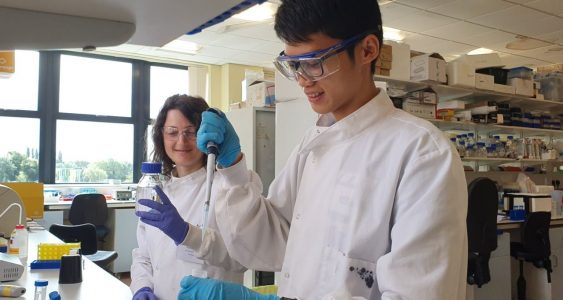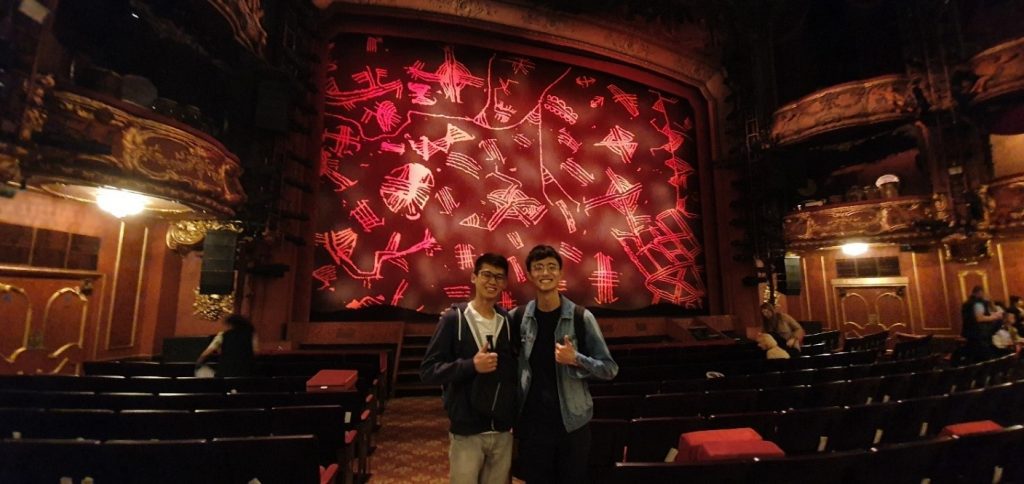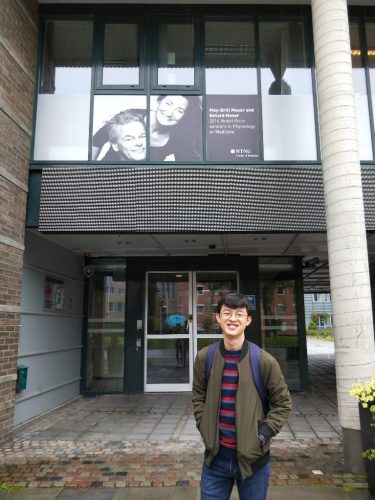A different final year experience – overseas FYP
Since June 2018, Year 4 Pharmacy undergraduate students undertaking the PR4196 Pharmacy Research Project & Scientific Communication module, more commonly known as Final Year Project (FYP), have the opportunity to perform their project overseas.
The FYP student exchange programme (FYP-SEP) is a Department-initiated programme where current overseas partners include the pharmacy/pharmaceutical/health science schools or faculties from the Norwegian University of Science and Technology (NTNU), University of Copenhagen, University of Nottingham (UoN), University College Cork (UCC), and Trinity College Dublin. The FYP-SEP offers students an opportunity to learn from international scientists, and grow as an individual, in a different environment.
This summer 2019, five Pharmacy students from the Class of 2020 took the leap of faith and joined the FYP-SEP to carry out their FYP at an overseas university. We hear from Jasper Koh (UoN), Teo Hong Kai (UoN), Wong Yu Han (UCC), Dong Lu and Benjamin Cheng (NTNU) on their experiences, takeaways and advice for students considering this programme.
How was your FYP-SEP experience like?
Dong Lu: It was an exciting experience. The programme structure was similar to the local FYP yet it was new for me because I was working in an overseas lab, supervised by an international scientist and learning new things from different perspectives. At the same time, I still received guidance and help from my NUS supervisor, which enabled me to keep a nice pace of my project and fulfil the goals of FYP.
Jasper: My main supervisor was very nurturing and patient in teaching me the necessary laboratory skills required to undertake my project smoothly. The PhD students who guided me were also helpful and approachable, clarifying my doubts whenever I faced a hurdle in my experiments. Overall, the School of Pharmacy exceeded my expectations in terms of its academic excellence in research and its quality of students and staff who displayed professionalism and expertise in their fields.

Jasper and his main FYP supervisor from Italy at the Gene Regulation and RNA Biology Laboratory, School of Pharmacy, University of Nottingham
Apart from research, what other interesting activities did you partake in during the FYP-SEP?
Benjamin: The medical students on campus invited me to join them on a rock climbing session, barbeque and board games session. During summer, the research center also hosted a summer barbeque party to commemorate the start of their summer holidays. I played a Norwegian children’s game where we had to throw a block to knock down our opponents’ home before being able to ‘kill’ the ‘king’. It was a really fun and interesting experience.
Yu Han: For the weeks that I didn’t have to go back to the lab during the weekends, I took short trips out of Cork city. Ireland has many scenic and breathtaking places to visit, and some of the places I went were Cliffs of Moher, Giant’s Causeway, Carrick-a-Rede and Blarney Castle. Apart from the stunning landscapes and wild coasts, I also visited the Guinness Storehouse in Dublin to learn more about how Arthur Guinness built the brand and enjoyed a pint of Irish Stout at the Gravity bar.

Benjamin and Dong Lu at a rock climbing session in Trondheim

Yu Han at the University College Cork
Jasper: We went for short weekend trips to nearby UK cities like London, Birmingham, and Glasgow and made short trips around Europe to places like Budapest and Amsterdam. I also attended a welcome session at the house of one of the professors, where we had barbeque food and light-hearted conversations with the locals.
Hong Kai: We got to hang out with other international students studying in the university and had the opportunity to attend the riverside festival, the largest festival in the whole of east midlands! Jasper, Yu Han and I even got to meet up in London to watch the musicals there. Overall, it was a nice break away from the hectic working schedule.

Jasper and Hong Kai at the Lion King Musical
How did you benefit from the programme?
Yu Han: Studying abroad has placed me in a foreign environment in which experience was no longer a reliable guide. I found myself treating new experiences with a far more open mind and with an unprecedented interest. In that process, I have gained perspectives I never expected myself to accept or understand. I have also learnt to speak up and verbalize my opinions. The Western culture is very open and accepting which made me feel less self-conscious and encouraged me to ask questions when in doubt.
Benjamin: Being in a country that treasured a proper work-life balance, I slowly began to adopt a similar lifestyle to them. Most of the time in Singapore, I tend to rush from one place to another to do certain things. However, in Trondheim, I had the luxury of time to relax and take things slowly. I was able to truly relax and do the things that I wanted and yet know when it was the proper time to work. The experience also allowed me to learn to adapt and be flexible in my working style that fits the culture of the people there. Singaporeans tend to be a bit more ‘chiong’ and want to get things done as quickly as possible. However, others may not be as comfortable with such an approach and there was a need to understand the process of work that was done there.
Jasper: I learnt to be independent not only in terms of living, but also learning. When I was overseas and alone, I found the compelling need to confidently and independently look for solutions when faced with problems. I also honed effective communication skills and built confidence, especially when explaining my project to my supervisor and peers, or when I required assistance outside of the university.
Hong Kai: I learnt and experienced things that I may not have a chance to do in Singapore. At the same time, I also gained a better appreciation for the things back at home. Exploring the countryside or even taking a short flight to neighbouring countries (make use of the relatively cheaper flights to see other European countries) was some of the experiences I treasure! Finally, I believe the huge takeaway for me was the eye-opening experience of working in a foreign lab and learning about the UK working culture.

Benjamin in front of his research group office building at the Norwegian University of Science and Technology
What are some challenges you encountered during the programme? How did you overcome them?
Jasper: This journey was undoubtedly beset with challenges, but I believe that that was where growth took place. One of the biggest problems I faced was the lack of on-campus accommodation in my last month of the FYP-SEP as the university had to make space for the incoming batch of students starting the new academic year. After at least 2 weeks of frantically looking for a place to stay, I settled for a private accommodation near the university. The situation was not ideal, but it was the best that I could hope for.
Dong Lu: I was not used to Norwegian food. Therefore, I learnt to buy ingredients from the Asian markets and cooked Asian food for myself. As things were expensive, I saved money by not eating out and comparing prices across supermarkets.
Hong Kai: The greatest challenge that I faced was managing and balancing my supervisor’s and my own expectations. I had to learn to better manage my own expectations and hope that things turn out alright in the end.
Will you recommend fellow Pharmacy students to do their FYP overseas?
Jasper: Yes, I will definitely recommend students to participate in a Study Abroad Programme. More often than not, we get disillusioned by the “safe space” in the comfort of our own country, and living overseas can give a broader view of what the world outside of Singapore offers.
Benjamin: Yes I would! The Study Abroad Programme allows you to broaden your learning experience to a different culture and location. You will get to learn much more than just the knowledge you have learnt in school.
What advice do you have for fellow Pharmacy students planning to undertake the FYP-SEP?
Dong Lu: Firstly, budget may help you decide where to go. Be also prepared to face difficulties in daily life especially due to cultural or food differences. Lastly, find someone to talk to, whom you can seek help and suggestions from.
Benjamin: Research the country sufficiently in different areas; transport, food, way of life. Know the location you are staying to ensure there are sufficient amenities for your daily needs. It will be a plus to have some basic knowledge of the language of the country you are going.
Yuhan: To keep an open mind and not to fear the uncertainty.
Article by Ms Ng Shi Ying (NUS Pharmacy staff)
